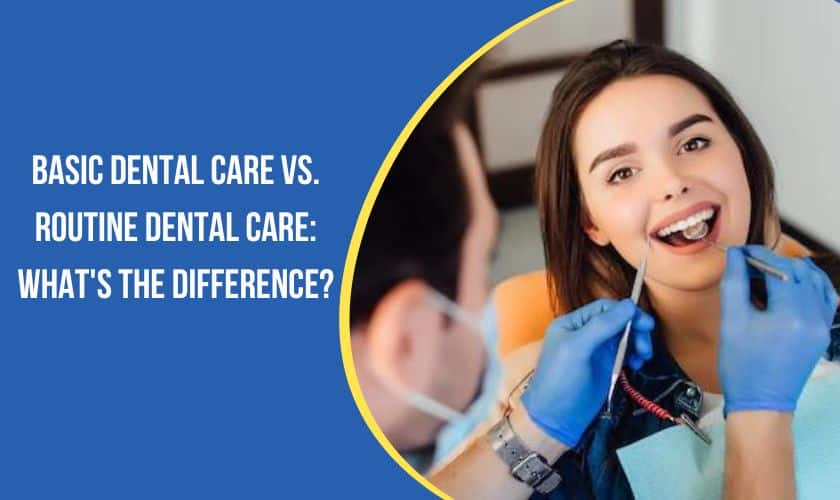Good dental care is essential for your overall health and well-being. Whether it’s basic or routine, the type of care you receive and how often you have it can make a big difference to your oral health, in this article, we’ll explore the differences between primary dental care and routine dental care so that you can better understand which one is right for you.
Basic Dental Care
Primary dental care includes preventive measures such as brushing twice daily with fluoride toothpaste, flossing at least once per day, eating a healthy diet low in sugar, visiting your dentist regularly (at least every six months), and having regular professional cleanings. These measures are essential because they help prevent cavities, gum disease, and other dental problems.
Routine Cleanings
Routine cleanings are an essential part of primary dental care. During a routine cleaning, your dentist or hygienist will remove plaque and tartar from your teeth, check for signs of decay or cavities, examine the gums for periodontal disease, polish your teeth to remove surface stains, and help you learn about proper brushing and flossing techniques.
X-rays
X-rays are also an essential part of primary dental care. X-rays allow dentists to see inside the mouth to check for bone loss or other changes that may indicate infection or disease. Dentists may also use X-rays to check for impacted teeth, wisdom teeth that need removal, and other dental problems.
Fluoride Treatments
Fluoride treatments are another part of primary dental care. Fluoride helps strengthen tooth enamel and makes it more resistant to decay. It can also help reverse the early stages of tooth decay. Dentists will usually apply fluoride treatments during routine cleanings or in the form of varnish, or gel applied directly on the teeth at home.
Routine Dental Care
Routine dental care refers to preventive measures beyond primary care, such as sealants, fluoride treatments, and procedures like root canals and crowns. Routine care helps maintain dental health and keep teeth free of decay, but it also addresses more severe problems, such as cavities or gum disease, that may have developed due to inadequate primary care.
Sealants
Sealants are a form of routine dental care that involves painting thin layers of plastic on the chewing surfaces of back teeth to protect them from plaque and bacteria. They are often recommended for children and teens who may not yet be able to brush their teeth properly. Crown sealants can help prevent cavities by sealing out food particles and other debris that can cause decay.
Root Canals
Root canals are another type of routine dental care. They are necessary when a tooth’s pulp becomes infected due to decay or trauma and needs to be removed. During a root canal, the dentist will remove the infected pulp, clean the area, fill the tooth with a particular material, and seal it off.
Crowns are routine dental care used to protect damaged teeth from further damage. A crown fits over an existing tooth and can be made from porcelain, metal, or composite materials. Crowns can help prevent decay and also improve the appearance of teeth that may have been damaged by cavities or trauma.
Conclusion:
Oral hygiene is critical for general health, and deciding between primary and regular dental treatment. Routine care goes above and beyond basic preventative actions like brushing and flossing by offering additional protection against cavities and other issues. Finally, the best approach to safeguard your oral health is to practice good oral hygiene habits and visit your Phoenix dentist regularly for examinations and cleanings.
FAQs:
- Is primary dental care enough to keep my teeth healthy?
While primary dental care is essential in maintaining good oral health, it should be supplemented with routine dental care like sealants and root canals to ensure maximum protection against decay and disease.
- What happens during routine cleaning?
Routine cleaning usually involves thoroughly examining your teeth, gums, and mouth to check for signs of decay or disease. The dentist will remove any plaque or tartar build-up, polish your teeth to remove surface stains, and help you learn about proper brushing and flossing techniques.
- Do I need X-rays if I practice good oral hygiene?
Yes, X-rays are an essential part of routine dental care. They allow dentists to see inside the mouth to check for bone loss or other changes that may indicate infection or disease. They can also be used to check for impacted wisdom teeth or other issues requiring more attention from a dentist.

